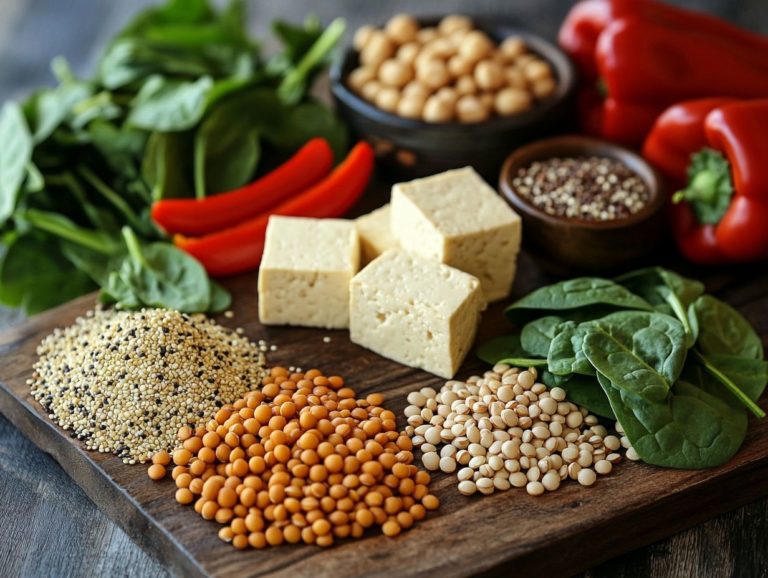Busting Myths: Do You Need to Count Calories?
Calorie counting has certainly made its mark as a popular method for managing weight, yet it often comes with a fair share of confusion.
What are calories, and why should they matter to you? This article delves into the truth about calories, highlighting the benefits of counting them while debunking common myths that may be holding you back.
Whether your goal is weight loss or simply maintaining a healthy lifestyle, you ll find alternatives to calorie counting discussed here, along with valuable tips to support your success.
Immerse yourself in this exploration and uncover how a deeper understanding of calories can truly transform your approach to nutrition and wellness.
Contents
Key Takeaways:

Understanding the role of calories in weight management is crucial for successful weight loss.
Debunking common myths and misconceptions about calorie counting can help individuals make informed decisions about their health.
While calorie counting isn’t needed for everyone, it can be a helpful tool for weight management when done correctly and in conjunction with a healthy diet and exercise.
What is Calorie Counting?
Calorie counting is a powerful tool that enables you to track the number of calories you consume through your food choices. This method gives you great insights into what you eat.
It can be especially advantageous if you’re aiming for weight loss, as it helps you grasp the delicate balance between the calories you take in and those you expend. This balance ultimately influences your energy levels and body weight.
The practice of calorie counting traces its roots back to the early 20th century, evolving alongside the strides made in nutritional science. Today, it continues to be a relevant resource, particularly as more individuals seek to understand and navigate the complexities of modern diets laden with processed foods.
By familiarizing yourself with caloric values, you gain a clearer perspective on portion sizes and nutritional content. This understanding can assist you in crafting balanced meals.
When you engage in consultations with health professionals, calorie counting can spark meaningful discussions about your dietary habits. It paves the way for personalized strategies that align with your health objectives.
The Truth About Calories
Grasping the reality of calories is vital for anyone looking to enhance their dietary habits or effectively manage weight. Calories represent a measure of energy derived from the foods you consume and play an important part in your metabolic rate and overall health outcomes.
Understanding this concept gives you the power to make informed choices that positively impact your well-being.
Understanding the Role of Calories in Weight Management
Calories are crucial in your weight management journey. They directly impact your weight loss efforts and the body s metabolic response.
Cultivating awareness of your appetite and understanding your unique eating patterns is essential. Grasping the connection between calories consumed and calories burned gives you the power to navigate effective weight loss strategies.
By balancing your calorie intake with energy expenditure, you can create a caloric deficit, which is vital for shedding those extra pounds.
Embracing different eating patterns like intermittent fasting or mindful eating can profoundly influence how you experience hunger and satiety. These patterns shape your eating behaviors and affect your metabolic rates, impacting how efficiently your body processes energy.
By tuning into your hunger cues and recognizing your body’s unique responses, you can make effective weight management not just attainable but sustainable.
Benefits of Counting Calories

Start counting calories today for incredible benefits in managing your weight!
Counting calories provides a wealth of advantages for those aiming to manage their weight. It cultivates a heightened awareness of food choices and fosters improved dietary habits.
Additionally, it opens the door to personalized nutritional guidance that supports effective weight loss and promotes positive health outcomes.
How Calorie Counting Can Help with Weight Loss
Calorie counting can be a valuable ally in your weight loss journey. It helps you track food intake, understand portion sizes, and listen to your hunger signals.
By logging what you eat each day, you can identify patterns leading to excessive calorie consumption. Whether you choose an app or a simple notebook, this practice enhances your dietary awareness.
Mastering portion sizes is also important. Using measuring cups or a scale reveals the true amount of your favorite snacks, preventing overindulgence.
Combining calorie counting with a personalized exercise routine allows you to burn calories and boost your metabolism. For example, if you commit to daily walks, you can better estimate your calorie burn and adjust your intake.
Meal prepping or planning snacks can help you stay mindful about eating. These strategies simplify your journey to healthier habits.
Myths and Misconceptions About Calorie Counting
Myths about calorie counting often stem from misinformation about food and nutrition. These misunderstandings can contribute to unhealthy eating behaviors.
Seek guidance from health professionals or trusted nutrition apps for accurate information and support.
Debunking Common Myths
It’s crucial to debunk myths about calorie counting for better understanding. Many people wrongly assume all calories are equal, ignoring the differences in nutritional benefits.
This view can lead to poor dietary choices, as not all calories offer the same health advantages. For instance, calories from whole foods like fruits and vegetables provide essential nutrients.
In contrast, processed foods with added sugars and unhealthy fats may share similar calorie counts but can lead to weight gain and health issues.
Understanding food quality alongside calorie content is essential for long-term wellness and a balanced diet.
Alternatives to Calorie Counting

If calorie counting feels restrictive, explore alternatives like intuitive eating and mindful eating. These approaches help you manage food intake while honoring your preferences.
Other Methods for Managing Weight
Methods like intuitive eating encourage you to listen to your body’s hunger signals. Follow dietary guidelines focusing on food’s nutritional benefits and meal timing.
Prioritizing nutrient-dense foods and being present during meals fosters a healthier relationship with food. This holistic approach helps you understand your body’s needs without fixating on numbers.
Knowing the principles of portion control and meal timing can enhance your metabolism. These strategies promote a sustainable lifestyle, allowing you to enjoy meals without the stress of strict calorie counting.
Tips for Successful Calorie Counting
For successful calorie counting, prioritize accuracy by maintaining a detailed food record, including portion sizes and any food-related symptoms.
This way, you’ll understand your nutritional intake, empowering you to make informed dietary choices.
How to Make Calorie Counting Work for You
To make calorie counting effective, be mindful of your food choices and adjust portion sizes. Regular exercise is also important, along with nutritional advice tailored to your needs.
Take a closer look at your meals. Prioritize whole foods over processed options to better understand how they affect your health.
Regular physical activity helps burn calories and boosts your mood. This fosters a sustainable lifestyle.
By customizing your portion sizes, you manage your intake without feeling deprived.
Consider reaching out to a nutritionist for a personalized approach that fits your health goals and daily routine.
Frequently Asked Questions

Is counting calories necessary for weight loss?
Counting calories can help with weight loss, but it’s not the only factor. Focus on your overall health and nourishing your body.
Can counting calories harm my mental health?
Counting calories can become obsessive and lead to unhealthy eating habits. Approach it with a healthy mindset.
Do all calories affect my body the same way?
No, not all calories are the same. The quality of calories matters; foods rich in nutrients are better for your health.
Can I eat unlimited calories if I exercise?
Not necessarily. Even with exercise, consuming more calories than your body needs can lead to weight gain.
Do I have to count calories forever to maintain my weight?
No, you don t need to count calories for life. Once you understand portion sizes and food values, you can eat intuitively.
Can counting calories help me lose weight faster?
Not always. Crash diets can slow weight loss and have negative health effects. A balanced diet and regular exercise are more effective long-term.






